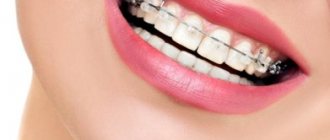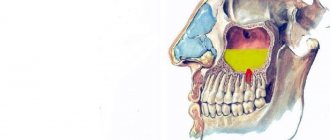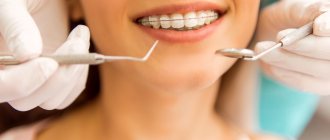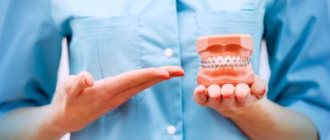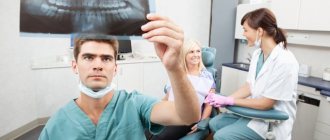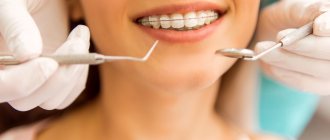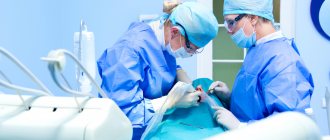- Reports and messages
- Professions
- Profession dentist
A dentist has always been an indispensable doctor, especially in modern society, when beauty and aesthetics come to the fore.
This is a doctor who treats the maxillofacial area. When diseases occur in the oral cavity, a dentist comes to the rescue. Since this type of medicine includes a fairly large part of the treatment, the dentist’s profession is divided into specifics. Doctors are working on bite and dental health. Surgery may also be performed.
One of the most familiar specialists to people is a dentist-therapist. This doctor conducts consultations and examinations of the oral cavity, that is, treats ordinary cases of diseases. For example, all kinds of inflammatory processes, caries, infections. When a person goes to the hospital with oral problems, this is the first doctor to visit. When the therapist sees that a given case is not within his competence, he redirects the person to the right specialist.
An orthopedic dentist deals with problems with bite problems and also provides patients with prosthetics. This is a narrow specialist for whom there are no secrets in these matters.
A dental surgeon is a specialist in extractions and other operations in the oral cavity. This doctor mainly inserts implants and also removes teeth that cannot be treated. This specialist is a wide-profile specialist; he treats the oral cavity from infections and neoplasms. Treats wounds throughout the entire mouth and neck. There is also a surgeon who specializes specifically in the maxillofacial part of the patient. His activities include complex operations that cannot be performed by a dental surgeon. For such operations, local anesthesia is used, as well as the highest skills in this field.
There is a separate pediatric dentist for children. This doctor has knowledge in psychology, because children need a special approach. Children are very afraid of dentists, so the doctor must show all his skills. The specialist has extensive knowledge in the field of treatment of primary teeth, because they have a number of features and differences from primary ones.
The list of specialists in the field of dentistry is completed by an orthodontist. His responsibility is to identify the abnormality of the teeth and jaw and treat it. He can heal all deformations and curvatures only if they arose naturally. If changes and disturbances occur in the case of injury, the doctor will transfer the patient to another specialist.
All of the above specialists can be combined under one word – dentist. There are quite a few educational institutions in our country where you can get a dental degree.
1st, 2nd, 3rd, 5th grade
History of the dentist profession
Surprisingly, the history of the dental profession is incredibly long.
The most ancient branch of dentistry goes back deep into the history of Ancient Egypt, dating back to 3500-4000 BC. The mummy of an ancient dignitary, which had signs of surgical intervention on the teeth, dates back to this period. There were many more Egyptian skulls with crowns on the teeth, and they belonged to people from different classes, which indicates a high degree of development of dentistry in Ancient Egypt. More than once, tombs contained well-preserved tools that closely resembled their modern counterparts. In addition, it was here that the first toothpaste of the original composition appeared (ashes of burnt bull entrails, ground eggshells, myrrh and crushed pumice).
In the 1st century BC, the first dentists appeared among the ancient Etruscans, who specialized specifically in dental treatment. They learned to make strong and durable dentures from animal teeth.
In one of the ancient Pakistani Neolithic burials, a drill and a nearby skull with traces of its impact were found, which may indicate that this artifact is the oldest dental instrument in the world.
The ancient Indians also used some dental techniques. In ancient times, opium and arsenic were widely used to relieve severe toothaches. The ancient Romans always added urine to their toothpaste because it was great at removing plaque.
In the 14th century, the Chinese learned to make toothbrushes from pig bristles or horse hair. But they got a bone handle much later - in 1870 in England.
The history of the emergence of the dentist profession in Russia officially began with Peter the Great, who introduced this position, after which this branch of medicine began to develop rapidly.
If we give a modern description of the dentist profession, then it is a high-tech science that is constantly improving methods for the prevention and treatment of oral diseases. The loss of a tooth has ceased to be a problem for her, since it can be replaced by extensions, prosthetics and other procedures with which a person can give himself a “Hollywood” smile.
Dentist salary
Several factors influence what a specialist’s salary is: education, region of work, industry, experience and employer, how long the work takes. 60% of dentists work full-time, 40% of specialists work outside normal working hours or on weekends.
The salary of a dentist in America is about $210,000 per year. Job pay ranges from $107,000 (lowest) to $340,000 (highest). This is the average annual salary including living expenses. The salary in Germany is about 26,800 euros per month. Salaries range from 12,300 euros to 42,000 euros. This is the average annual salary for a dentist, including living expenses. In Canada, a dentist earns about $131,000 per year. This is the average salary for a dentist in Canada. An entry-level specialist (with 1-3 years of experience) earns an average of 1,100,000 rubles per year in Moscow. A senior level dentist (8+ years of experience) earns an average of 2,100,000 rubles per year. The average salary of a dentist in Moscow is 1,700,000 rubles per year. Or the equivalent hourly rate is 900 rubles per hour. This is 25% more than the average salary of a dentist in Russia. The salary in a private clinic is higher than in a public institution. These estimates are based on wage survey data obtained directly from employers and anonymous workers in the capital of the Russian Federation. A dentist in Russia usually earns about 80,000 rubles per month. The salary is 56,000 rubles (minimum), 180,000 rubles (maximum) for qualified workers with experience.
Types of dentist profession (specialties)
Not all people understand many of the names of medical professions, so it is necessary to clarify which of these specialists does what.
Dentist-therapist
Responsible for diagnosis, examinations and general treatment. He can fill and restore teeth in the simplest way, prepare the oral cavity for prosthetics, remove nerves, and also treat a number of diseases (flux, caries, pulpitis, periodontitis, gingivitis and inflammation of the nerves).
Dentist-orthodontist
It is related to the correction of incorrect position of teeth in the oral cavity (when teeth sit either too sparsely or run over one another). The main tools in the profession of “orthodontist” are plates, braces and traymers.
Orthopedic dentist
The profession of “orthopedic dentist” involves prosthetics and dental restoration. The first option is used when there is nothing left to save, but with the second, restoration of the diseased tooth is still possible. Orthopedists are assisted by dental technicians.
Dental surgeon
The profession of “dental surgeon” indicates that the doctor operates on the jaws, facial joints and bones, and removes teeth in case of defects, tumors, injuries and other diseases. They also prepare the oral cavity for surgery performed by an orthopedist and remove the implants.
Dental hygienist
It is needed to examine the oral cavity and teeth, remove plaque, and polish enamel. He also advises on the prevention of dental diseases and hygiene procedures.
Periodontist
Their area of action is the gums and soft tissues that support and surround the teeth. They will also help with tooth mobility, bleeding gums, the appearance of tartar and plaque on the teeth, and bad breath.
Pediatric dentist
The profession “dentist for children” specializes in the same functions of a dental therapist, but only when applied to children’s bodies, for example, when removing teeth.
Dentist-prosthetist
After the patient has attended a consultation with a dentist, who has recognized the impossibility of treating the tooth with the tools available to him, the prosthetist begins to deal with it. The latter can offer the patient different options for dentures, after which he makes impressions of the teeth, which are matrices for the manufacture of dentures. Then the prosthetist tries on the manufactured prosthesis, adjusts it and securely fastens it in the client’s mouth.
Who are orthodontists?
An orthodontist is a dentist who specializes in eliminating anomalies of the dentofacial apparatus. Sometimes people think that this doctor only treats injuries, for example, sets jaws, but this is a mistaken opinion. An orthodontist corrects only hereditary, congenital or acquired defects at an early age. Among the most common pathologies treated by an orthodontist, we highlight the following:
- malocclusion (both mild and serious anomalies);
- non-standard dentition (crowding, elongation and expansion);
- breathing problems;
- incorrect position of one or more teeth;
- disorders of chewing or speech function;
- unnatural shape of one or more teeth;
- facial asymmetry.
At the appointment, the doctor explains why the listed pathologies do not always appear from birth, and this does not take a day or two. It is not uncommon for the bite to develop incorrectly several years after birth or even at school age. A good orthodontist always makes a diagnosis before starting correction and determines the type of pathology based on the time of its occurrence.
- Congenital. This type includes pathologies associated with the shape of teeth (both primary and permanent), as well as their absence (complete or partial). These defects appear due to improper development of the fetus at the embryonic stage. Despite the complexity, a qualified orthodontist will be able to eliminate such an anomaly.
- Hereditary. This kind of pathology is transmitted to children from parents. These include malocclusion, the presence of supernumerary teeth, diastema and trema. To diagnose this type, the dentist performs additional procedures.
- Acquired. This category includes pathologies that arose several years after birth. Their orthodontist usually treats them faster than others, since acquired defects can be detected at the very beginning of development and prevent their worsening. Braces are traditionally considered the most effective treatment with orthodontic devices.
Depending on the situation, during the period of bite correction, the orthodontist is also involved in organizing preparatory measures. The specialist carries out a lot of manipulations necessary for subsequent aesthetic changes, orthopedic or surgical intervention: installs mouthguards, plates, braces. In addition, the dentist eliminates problems associated with the position of the teeth, since it is often necessary to prepare for prosthetics or implantation.
Now there are a lot of opportunities for people who want to correct their bite. There are orthodontists not only in free hospitals: entire clinics are opening everywhere, where appointments are available every day. Almost any such institution has a qualified orthodontist who can easily and quickly install plates or braces.
An orthodontist can correct almost any defect associated with the dental system. For this purpose, both various braces and removable structures are installed: veneers, lumineers and others. In order to correct the bite in the shortest possible time, it is important to remember that the doctor always installs the device and chooses the technique that is most suitable in each specific case.
Pros and cons of being a dentist
Like any other, the dentist profession has its pros and cons.
Advantages of being a dentist:
- high salary;
- demand in the market for good specialists;
- the possibility of opening your own office or clinic.
Disadvantages of being a dentist:
- almost inaccessible free education due to great competition;
- Like any medical profession, dentistry is a poor choice for sensitive people.
Where can you become a dentist?
Today, dentistry is a prestigious profession, highly paid and gives the opportunity to realize oneself in private business by opening one’s own dental office. Therefore, many young people are interested in where they can get a dental profession? The answer is simple - in one of the medical universities, you just need to graduate from the dental specialty:
- Surgical dentistry.
- Therapeutic dentistry.
- General dentistry.
- Orthopedic dentistry.
- Orthodontics.
- Pediatric dentistry.
The profession of dentist is also available to those who graduated from a medical university in another specialty, but for this they need to undergo postgraduate training in one of the dental specialties.
This profession can only be mastered after a long period of training, so if young people are interested in the dentist profession, they can find out what exams they need to pass at a medical university that graduates such specialists; today these are the Russian language, biology and chemistry. It is absolutely certain that this education will be very expensive in modern conditions. True, it is also true that the subsequent practice of a well-established specialist will quickly recoup all the costs of training, because the work of a dentist is very well paid. However, the latter greatly depends on the place of work.
A dentist can count on career growth not only as a professional (upgrading his qualifications while working in one position), but also in administrative terms (from a doctor to a chief physician).
Video about the profession of “dentist”:
What skills and qualities are important for the job?
To become a successful orthodontist, you need to possess a number of human qualities and skills. An orthodontist, like any other specialist, must be a master of his craft, because the health and appearance of a huge number of people depends on his work. This is not an ordinary dentist who sees a client approximately once every six months, so it is especially important to establish trusting contact.
- Personal qualities important in the work of an orthodontist include communication skills, diligence, and tolerance.
- A doctor must be to some extent a psychologist in order to be able to win people over. For most patients, having to correct the bite and wear braces will be a great stress, and the orthodontist must take this into account.
Only a doctor who is able to cope not only with his own doubts, but also with the client’s concerns can become a real specialist. This is not easy, which is why orthodontist is a fairly highly paid profession. However, sometimes even a decent salary cannot retain an employee who finds it difficult to cope with the workload.
The success of an orthodontist depends not only on qualifications and communication skills. Not the least important role is played by the chosen method of work, the responsibility of the client himself, and even how the dentistry is equipped.
What does it take to be a dentist? Personal qualities and skills
- Dentistry requires excellent coordination and developed fine motor skills, excellent vision and long-term memory. After all, the slightest inaccuracy can cause the patient severe pain or even lose a tooth.
- A dentist needs to know the anatomy and physiology of the human body, and not just the structure of the teeth and oral cavity.
- He must have excellent knowledge of medicines, instruments related to the profession, understand the latest materials and much more that is encountered in the practice of a dentist.
- The dentist must be able to use complex x-ray equipment and interpret its images. This is a very responsible and careful job.
- Among the features of the dentist's profession is that he must also be a good psychologist, able to communicate with nervous patients who tend to react sharply to any careless word. Delicacy, consideration and balance are required when dealing with patients who are often in a stressful situation.
Unbalanced and overly impressionable people are better off not going to the dentist.
Where can I find a job as a dentist?
Dentist vacancies are available in regular clinics and in private or public dental institutions. The specific nature of the work never leaves dentists idle.
Job responsibilities of a dentist
- Reception of patients and their treatment.
- Sanitation of the oral cavity and preventive examinations.
- Maintaining medical records.
Certain dental specialties have additional responsibilities. For example, an orthopedic dentist is responsible for working with optical instruments and micro-invasive prosthetic methods.
Requirements for the profession of a dentist
People who have:
- higher medical education;
- certificate for each specialization and medical book;
- work experience in the specialty;
- computer knowledge.
The difference between a dentist and a dentist
A dentist is a dentist who is a paramedic. This concept is more commonly used abroad; in some countries it simply has not taken root.
This profession differs in the type of education. You can study at a medical school, college and get a secondary education to become a dentist, but dentists only need a higher education. Accordingly, their specialization will be different.
Responsibilities of a dentist:
- examination of the patient, making a primary diagnosis;
- gum treatment;
- installation of seals;
- oral hygiene instructions;
- provision of pre-medical care and referral to specialists;
- assistance in choosing toothpaste and brush.
A dentist is trained to work with simpler cases than a dentist, so his income will be different.
